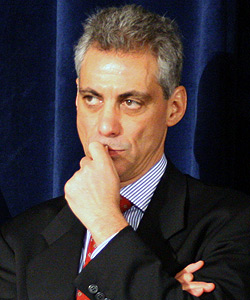
Lately, I’ve been talking a lot with Fred Beuttler, the deputy historian of the House of Representatives and a font of knowledge about that institution. He’s particularly good on local congressmen because he’s Chicago-bred; before going to Washington, he was a historian at the University of Illinois at Chicago.
Recently, we discussed one of my favorite subjects: Chicagoan Rahm Emanuel, the former congressman for the 5th District, now serving as chief of staff to President Obama. Beuttler speculates that Emanuel will remain in that job through the 2010 midterms. Rahm’s ambition was—and probably still is—to be the first Jewish Speaker of the House. Had he not been sidetracked by Obama’s plea to come to the White House, he would have eventually reached his goal, Beuttler says.
Since the passage of the health-care bill, Rahm hasn’t been seen much in the corridors of Congress, but he was around more before, often heard saying that the White House job “cost him his independence.”
“[White House staffers] are not their own boss anymore—like you are when you’re a member of Congress,” Beuttler explains.
Departing from the conventional wisdom that Rahm will return to Chicago to run for mayor (if Rich Daley opts out), Beuttler bets that Emanuel will stay in Washington and become head of the Democratic National Committee, a spot now occupied by former Virginia governor Tim Kaine. (Rahm moved his wife and children to D.C. last summer.) As DNC chair, Kaine, who was hand-selected in January 2009 by President Obama (the DNC traditionally defers to a sitting President’s choice) has no set term limit. He, in effect, serves at the pleasure of the President and the state party chairs. “Kaine will definitely serve through the ’10 midterms,” says Beuttler. Beyond that, his future depends on how well the Democrats do in November.
In the 5th congressional district, Beuttler speculates that Mike Quigley, Emanuel’s replacement, would be unlikely to step aside for his predecessor to renew his path to the Speakership.
If Emanuel could arrange to return to Congress, Beuttler says, “he could jump back on the leadership track.” Still, he would have to wait for Nancy Pelosi—whom Beuttler calls “probably the most powerful speaker in 100 years”—to step aside. (The current leadership—Pelosi, 70; Steny Hoyer, 70; and James Clybourn, 69—are a good generation older than Rahm, who is 50.)
I interviewed Emanuel a few years ago when I was writing about Bill Clinton and Bill Daley, and his answers were always short, blunt, and profanity-laced. His press aide, Matthew Lehrich, responded to my questions about Rahm’s post-White House plans with an e-mail that said, “We’re going to pass on this.” Had the response come directly from Emanuel, I imagine it the “no comment” would have been a bit more colorful.


